The Gisclard Bridges,
precursors of the large stayed girder bridges
2nd
part - Michel Wagner
Then were built:
Dormans
- Marne -
(range of 61m -08/1918)
Pontoise- Val d'Oise (range of 82.30m -
09/1918)
Pommiers _Aisne -
(range of 80 m -
09/1918)
Attigny/Aisne -Ardennes - (range of
69.20m05 -1919)
Braux/Meuse - Ardennes -
(range of
71 m-
05/1919)
Cumières/Marne
(range of 71.50 m-12/1919)
(
Sce : D. Leinekugel Le Cocq)
Bridge
at
Dormans,
in the Marne,
built
in 1832, rebuilt
in 1849,
was destroyed in
1918 during
the
second battle of the
Marne.
military"Génie"
as soon
rebuilt it, using
Gisclard
system
Pictures of the reconstruction in 1918
Source:
Opérateur Théta - Médiathèque de l' Architecture
et du patrimoine - Réunion des Musées Nationaux
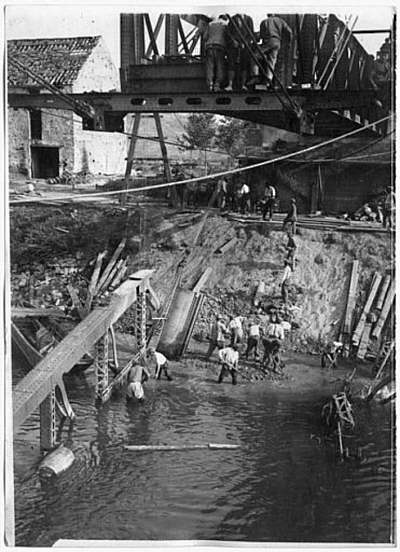
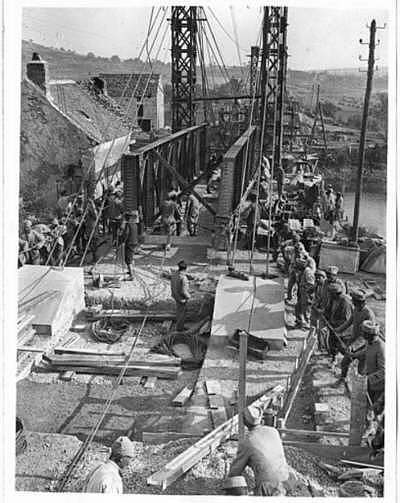
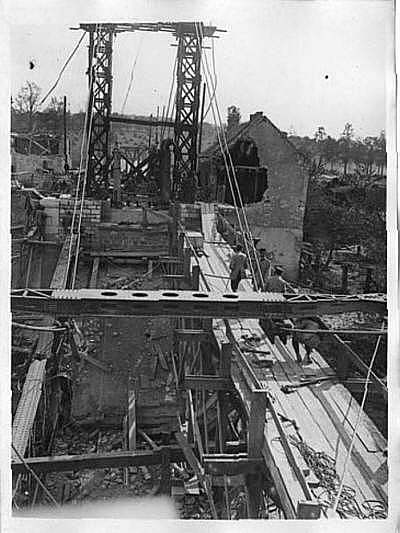
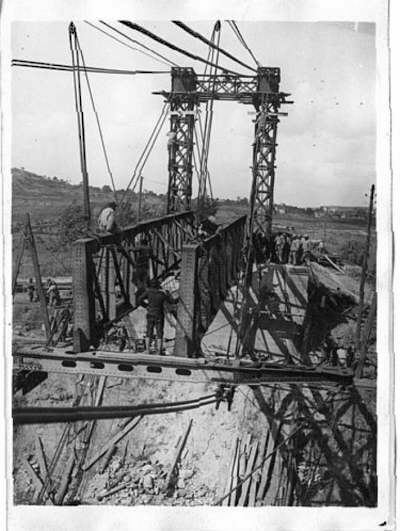
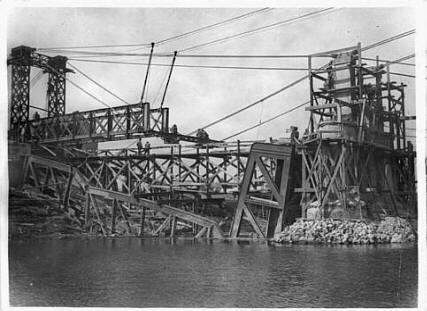
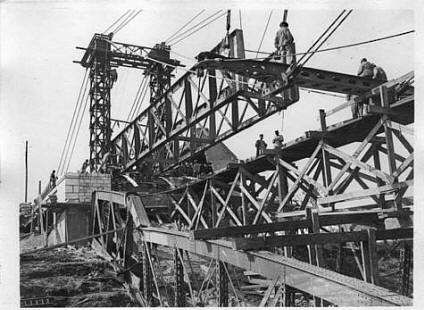
Bridge at
Dormans - Old postcards
(Coll. M.W.)
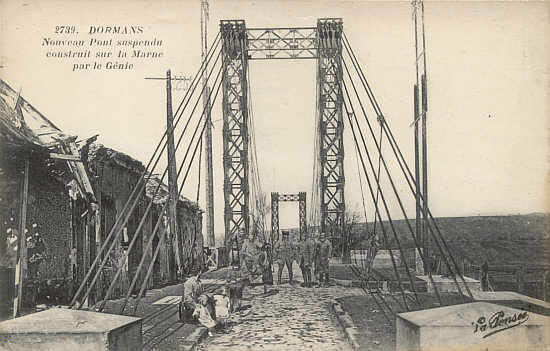
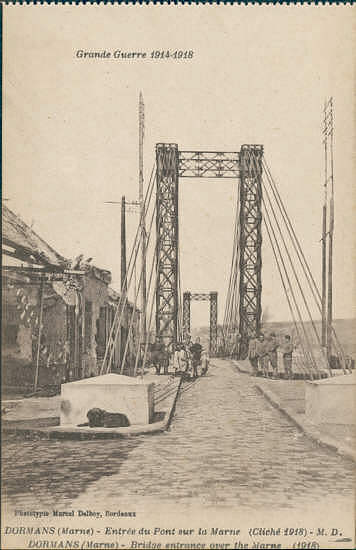
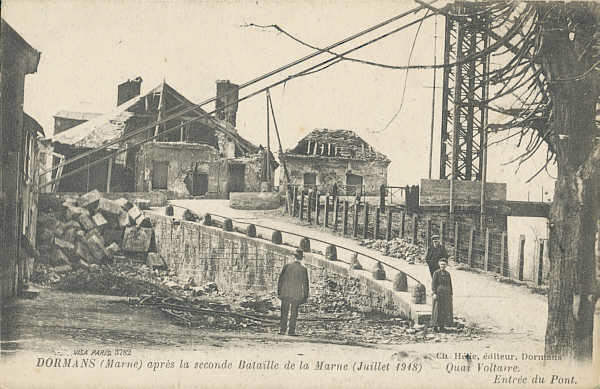
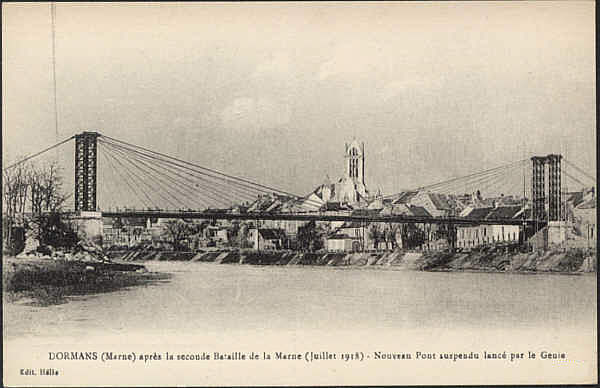
A
temporary wooden
bridge, set up after its destruction,
the bridge at Pontoise
near Noyon
was also
rebuilt in 1918
Pontoise' Bridge
bold poscard
(Phototypie Baudinière Paris)
(Coll.
M.W.)
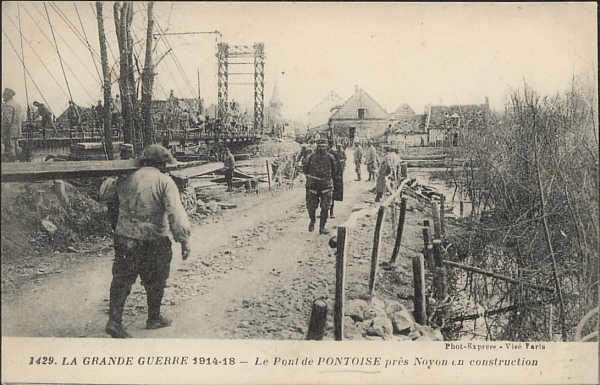
The bridge and the wooden bridge in 1918 - postcard
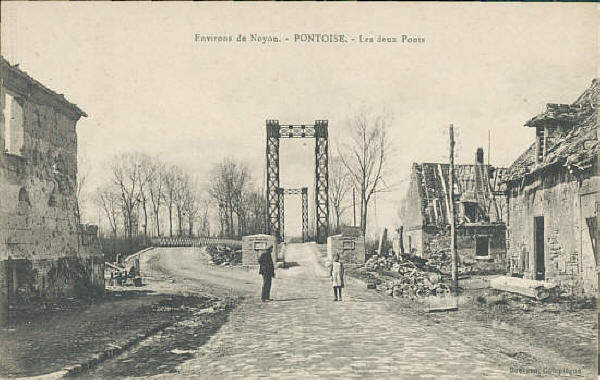
After the reconstruction.. Postcard
(Phototypie
Baudinière Paris)(Coll.
M.W.)
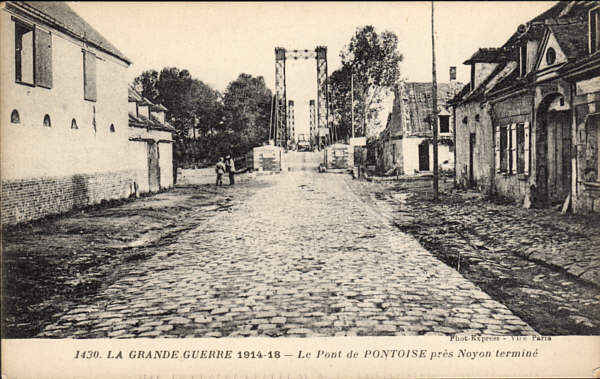
Then came the reconstruction,
completed in September 1918,
of he bridge at
Pommiers
in Aisne
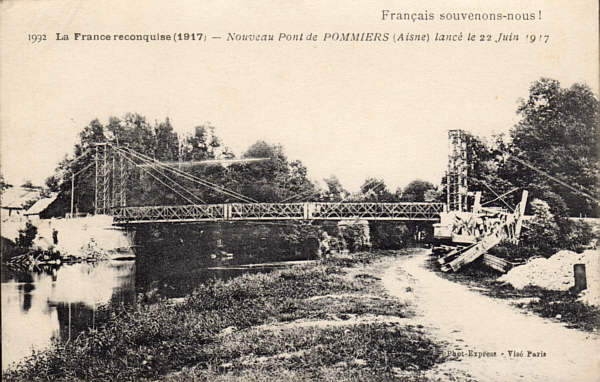
Pommiers'bridge old poscards (Coll. M.W.)
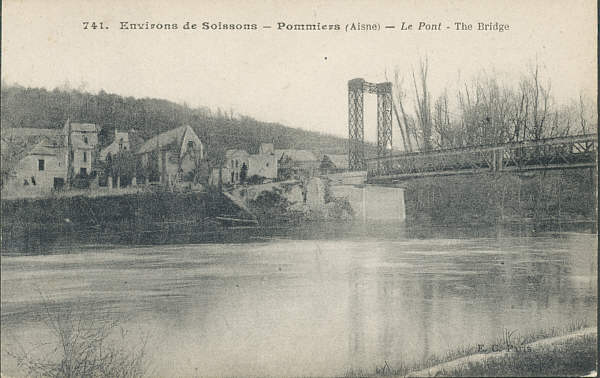
The bridge at
Pommier in 1918 Photography
Source: Médiathèque
de l' Architecture et du patrimoine - Réunion des Musées Nationaux,
indicating a date
of 1917 ...
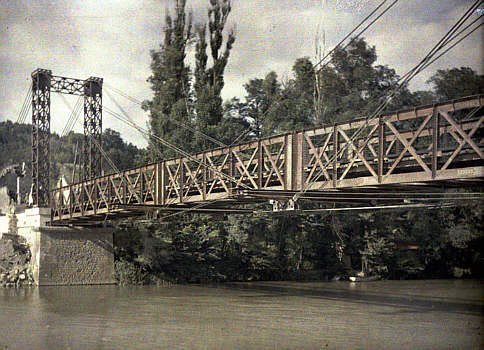
December 1918, the rebuilt bridge
Attigny in the Aisne, is put back
into service ...
The Attigny bridge- old postcards (Coll. M.W.)
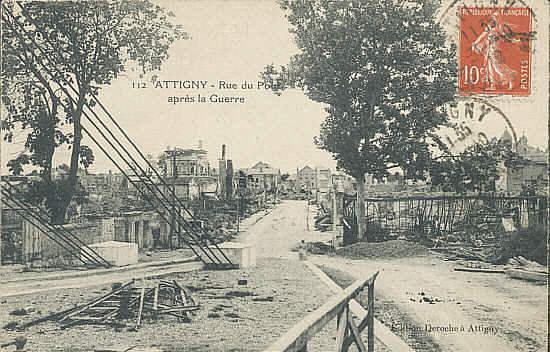
Poscard sent in 1921
Ed Deroche Attigny
(Coll.
M.W.)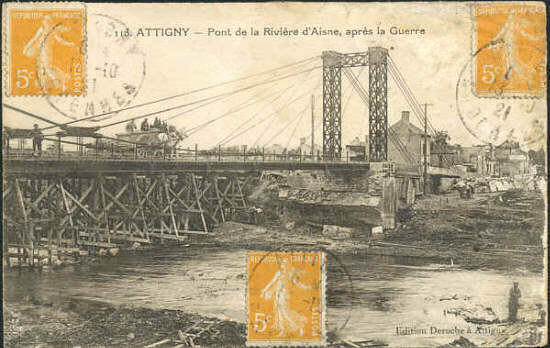
Postcard
1920 Roge Ed.(Coll.
M.W.)
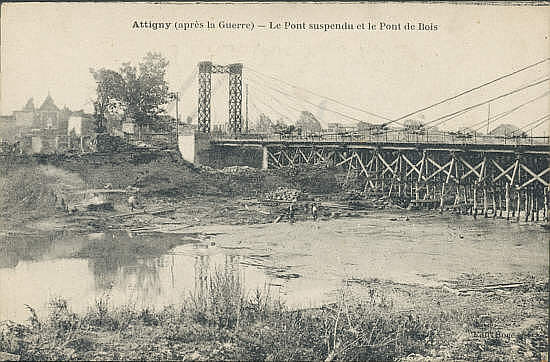
The reconstruction of the
bridge at
Braux
over the Meuse
in the Ardennes
-(Bogny-sur-Meuse
in 1967), was completed
in May 1919...
Bridge at "Braux ", over the Meuse river
- Ardennes, old postcard(
Ed
Guillaume Charleville(Coll.
M.W.)
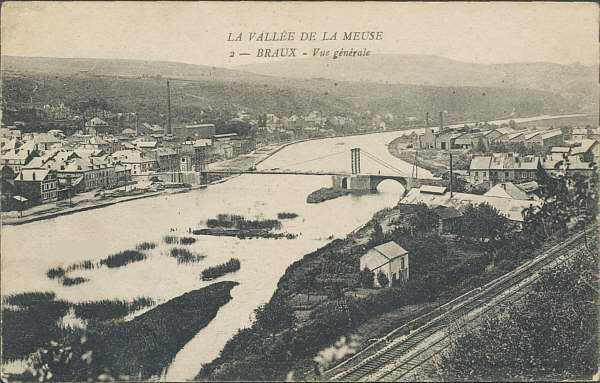
Poscard sent in 1927 -
Ed Puiseux
M...(Coll.
M.W.)
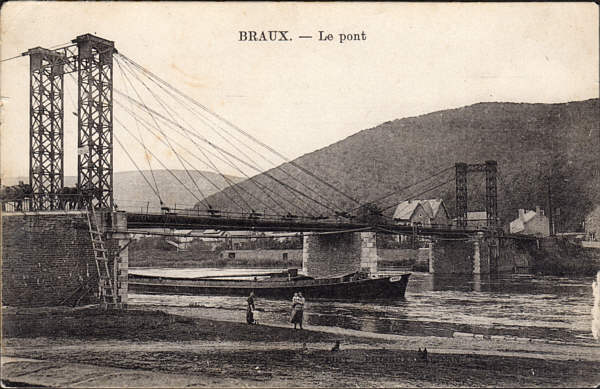
Carte postale
envoyée en 1923 Ed
Guillaume Charleville(Coll. M.W.)
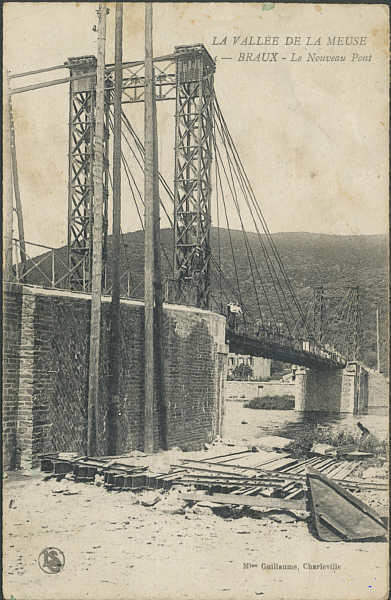
Reconstruction of the
bridge at Cumières(Marne)
in December
1919 -
the life
of the bridge
will not exceed
a few years.
Bridge at Cumières
- old poscard (Coll. M.W.)
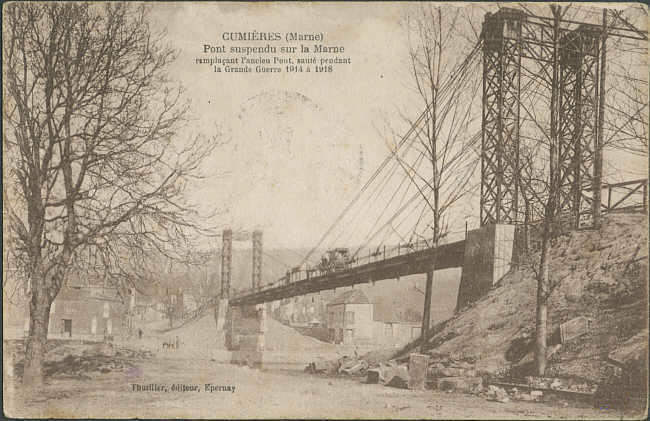
Construction of the Bridge at Cumières:
"Blondin" in action (suspended trolley used for the construction=)
Picture-card- (Coll. V.Mangeot)
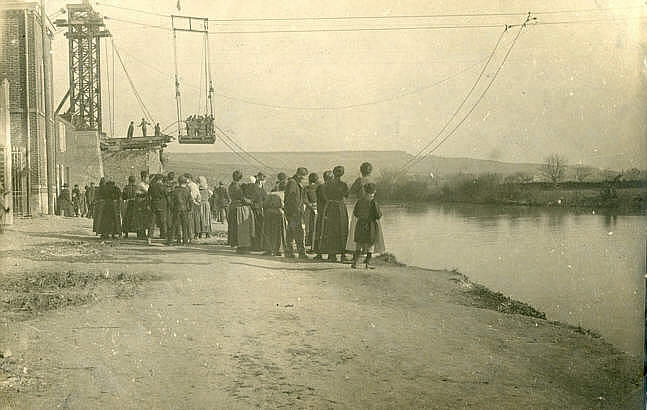
Construction of the Bridge at Cumières
Picture-cards
(Coll. V. Mangeot)
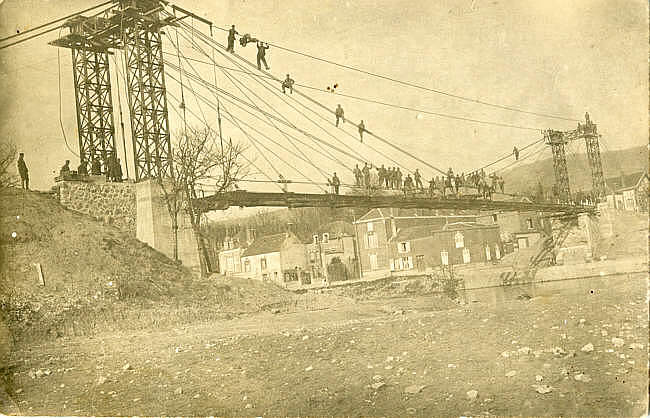
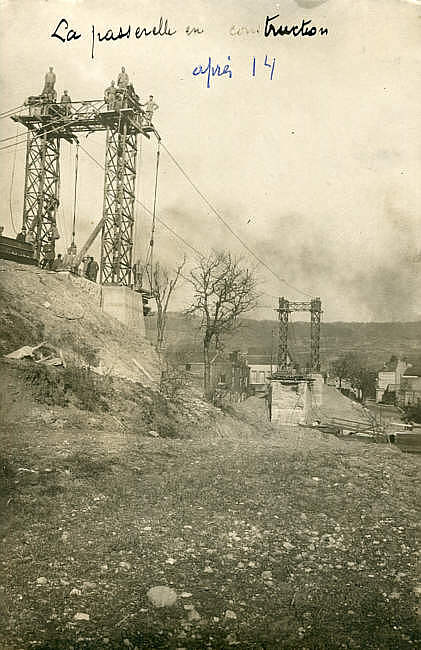
In 1921, in Précy on Oise, a bridge gisclard is built to replace a suspension bridge destroyed during the First World War (span 61.74m). Destroyed during the Second World War, it will be rebuilt in 1941 with a reinforced concrete deck. The Arnodin establishments will modify it in 1974 by adding parabolic farms and steel stiffening girders to it.( Sce : D. Leinekugel Le Cocq)
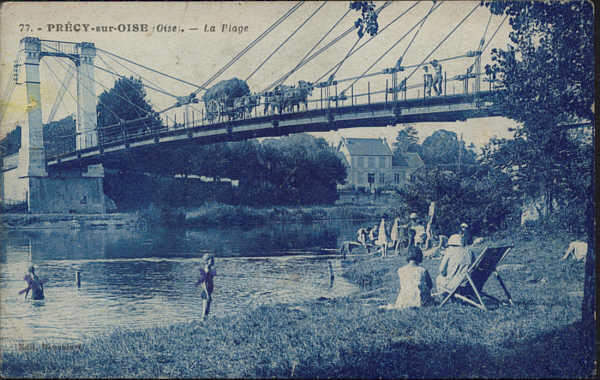
Bridge at Précy sur Oise- old postcard(Coll. M.W.)
Bridge at Prècy-sur-Oise Poscard
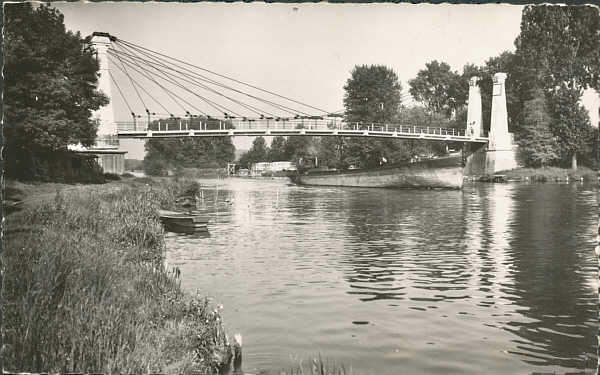
In 1923, the 7th Engineering corps builds in two months a bridge
in the Polygon of Villeneuve-Lès-Avignon become a test center of
assembly). This construction is told in the Magazine Of the Military
engineering of July-December, 1923 (volume LIII)
Soldiers'
battalion of the 7th Engineering in front of the bridge under
construction- Picture-cardS (coll. M.W.)
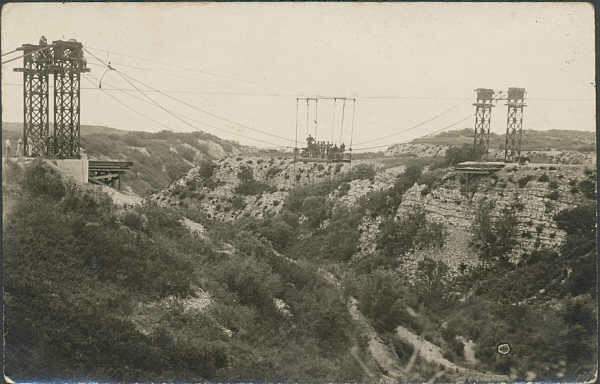
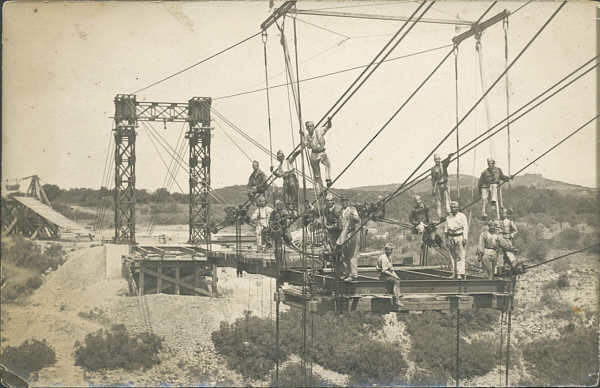
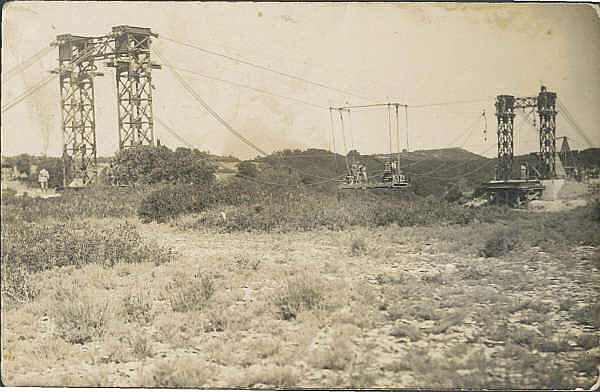
Poscard sent in 1928
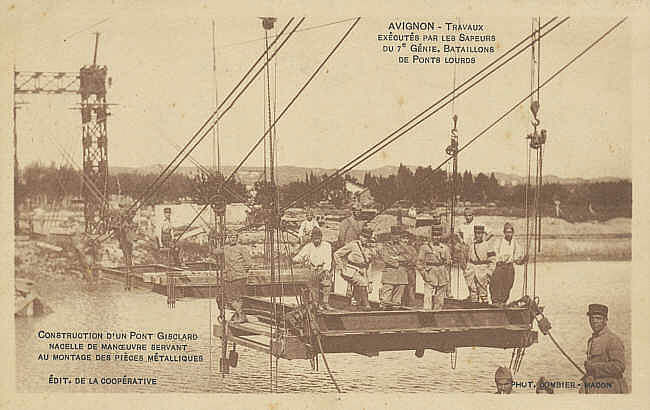
This building
is told in the Journal
of Military Engineering
From July to December 1923
(Volume LIII)
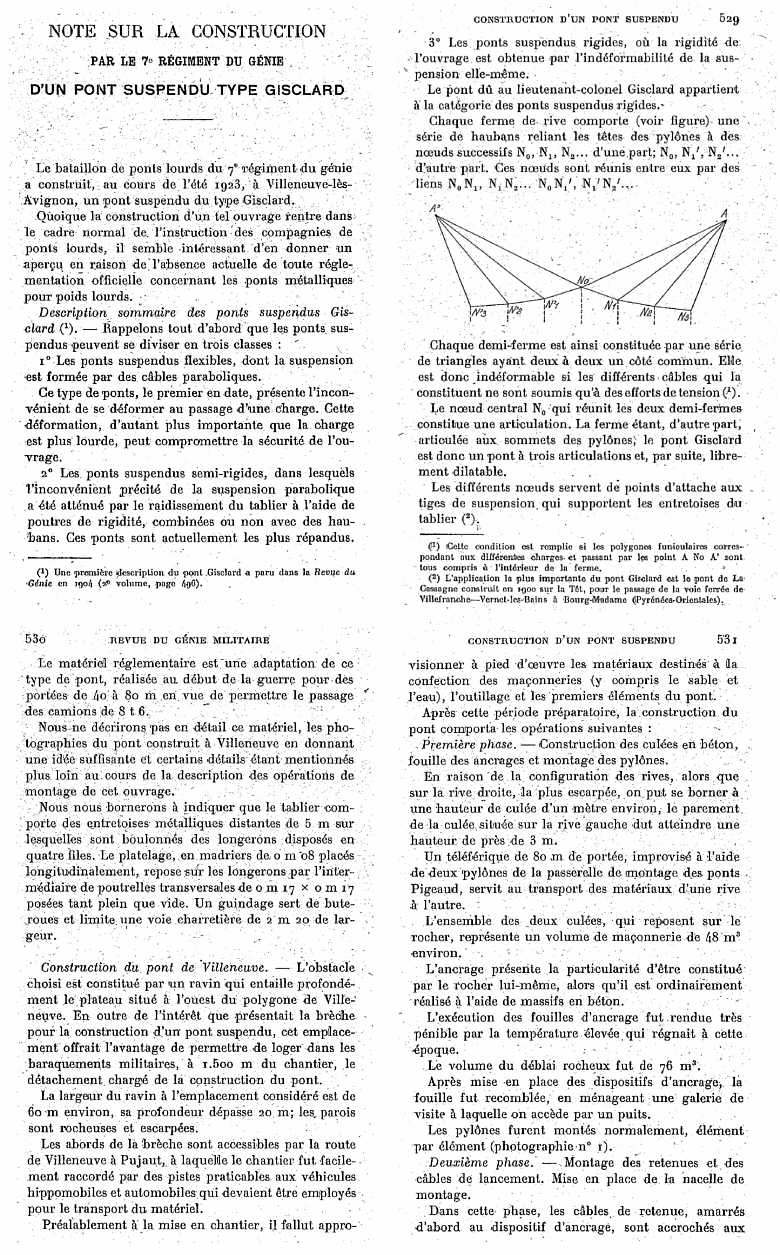
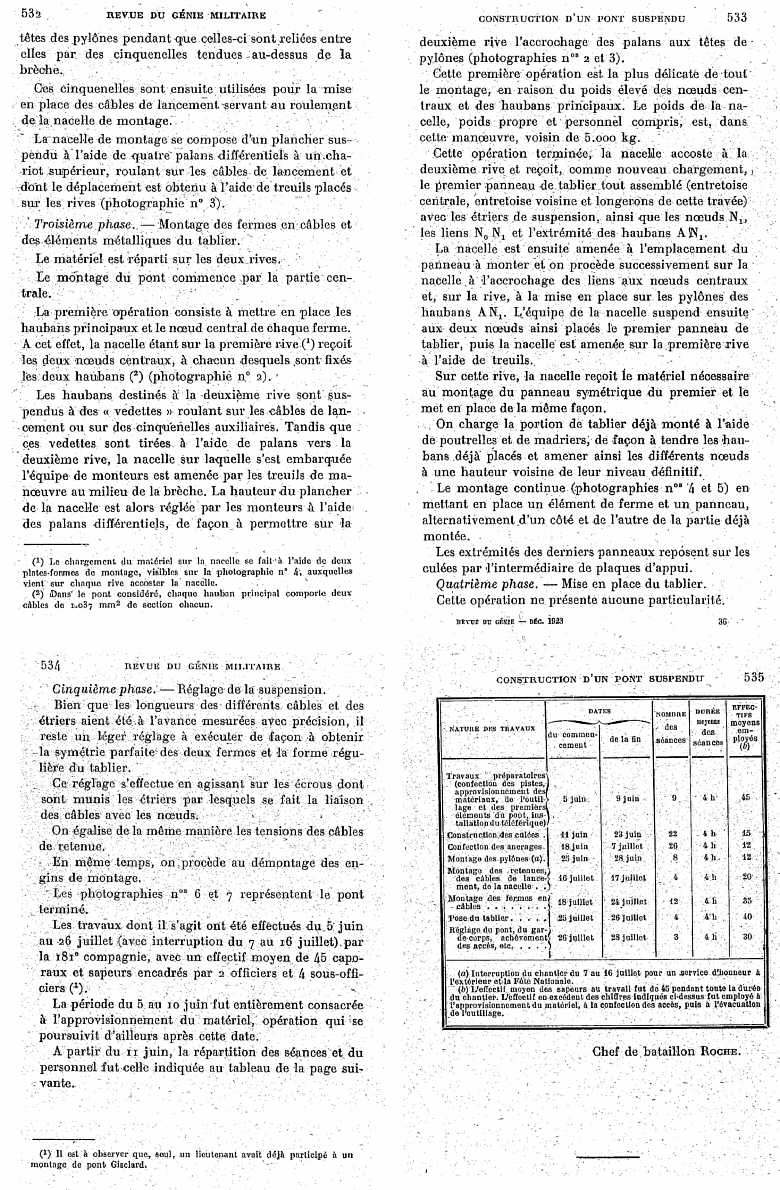
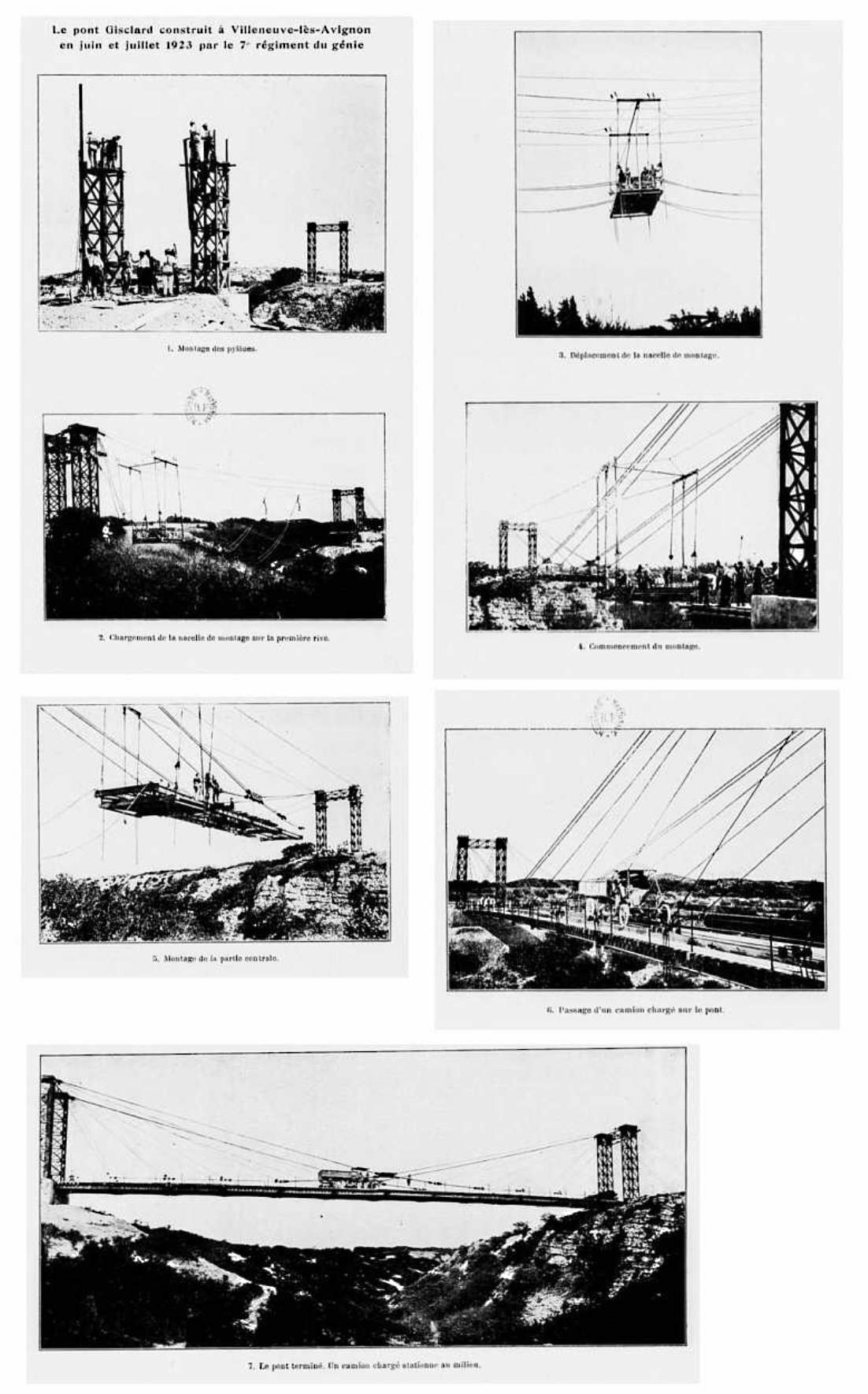
Engineering battalion front of the
bridge construction.
Photo-Cards
(coll. MW)
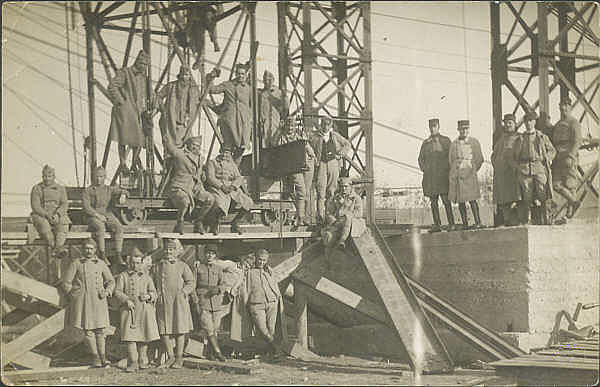
Reception of the
bridge - Picture - card from 1923 (coll. M.W.)
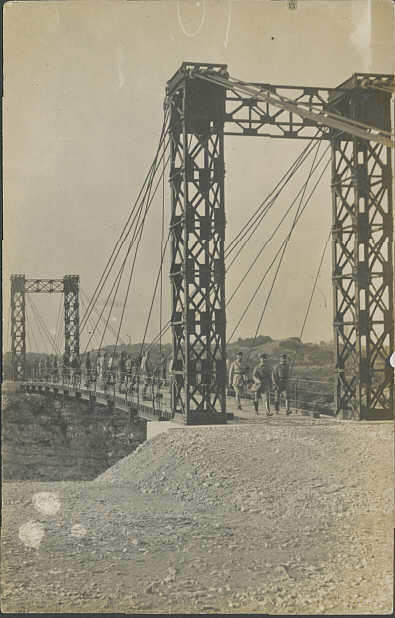
Old poscards sent in 1928(
coll. M.W.)
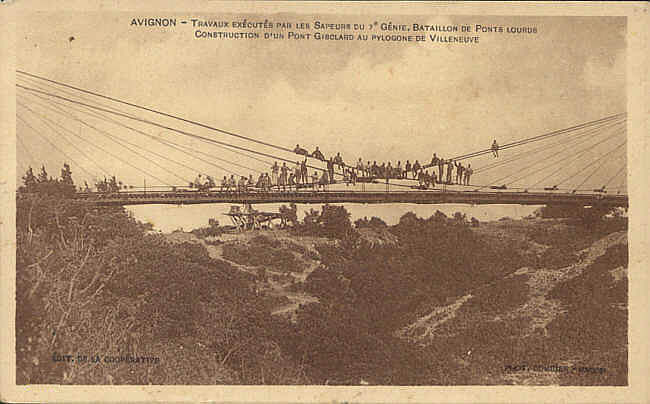
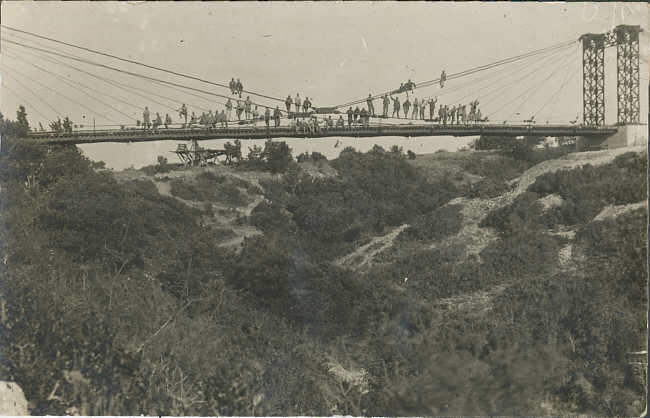
1924
Erection of
bridge of
La Baronia,
t, based in central
Camarasa, near Barcelona-Spain
(opening 55.34m)
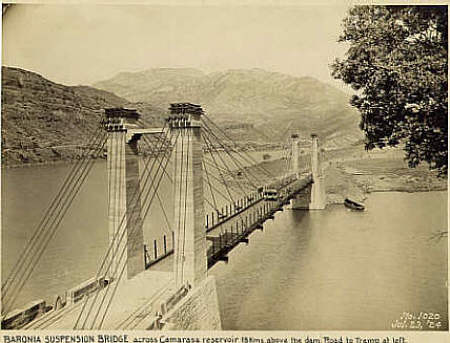
The bridge of Baronia
and the bridge at Révin
photographies , - coll D.Leinekugel Le Cocq
The bridge of Baronia
nowadays ( Photo Robert -
Flickr)
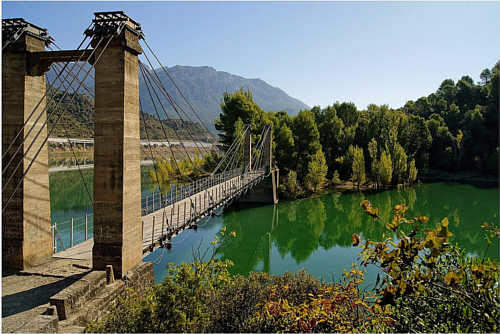
And the same year the rebuilding of
the suspension bridge of Revin -
(the Ardennes)
Revin
-Ardennes,
Old postcards
(Coll. M.W.)
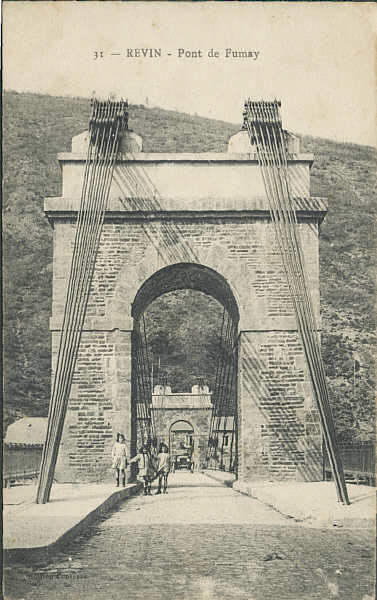
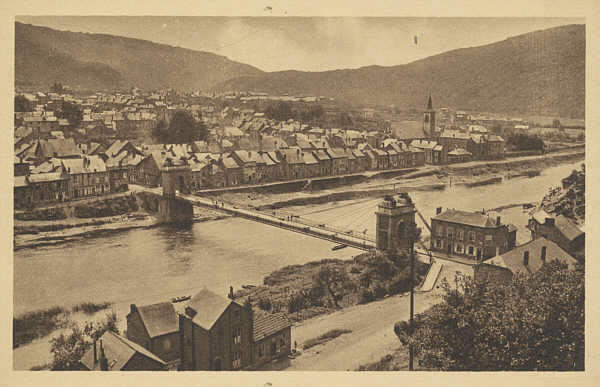
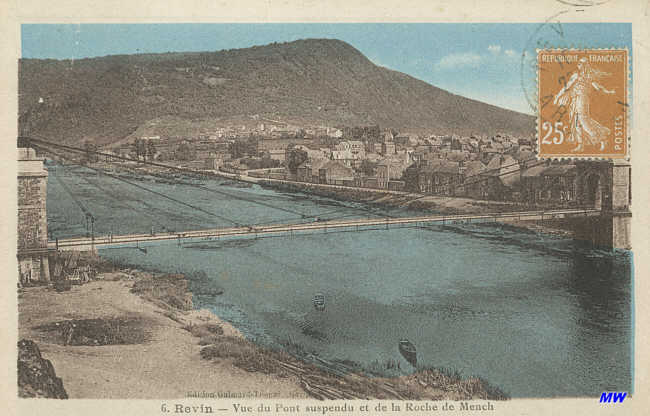
This bridge located on Trieux (Cotes d'Armor) is interesting in more than one way. The current bridge was designed and built on contest by Gaston Leinekugel Le Cocq in 1924 to support the metric gauge track of the railroads of the Coasts of North, to replace a suspension bridge built in 1840 by the company of the Seguin brothers , then repaired , and his wiring replaced by Arnodin between 1882 and 1889; the apron measured 151 m then.
It is the Company installed per G Leinekugel Le Cocq with Larche which will be in charge of work.
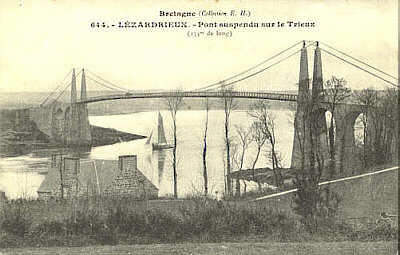
Old postcard,
the suspension bridge of Lezardrieux with the system of Arnodin
suspension
(Coll. M.W.)
Elevation
ofthe bridge suspension according to the model Arnodin and
Projet built by Gaston Leinekugel LeCocq
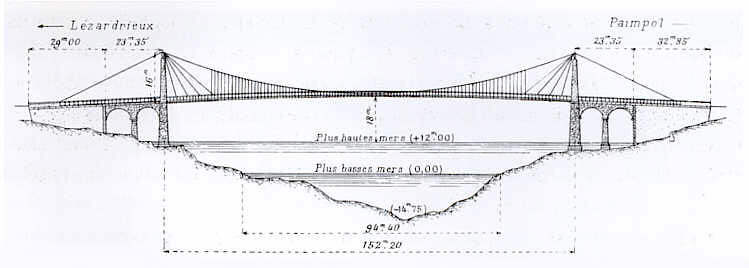
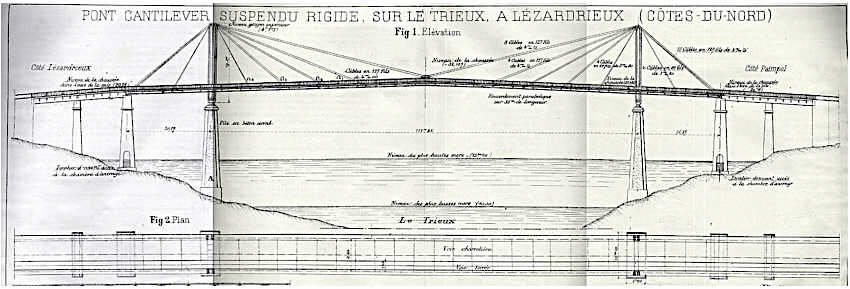
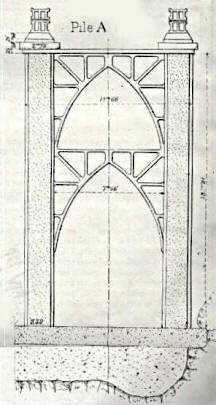
The innovation of G Leinekugel LeCocq in this modified version of a
bridge of the Gisclard type lies in the vertical provision of the system
of anchoring of the cables:
"the
particular characteristic of this new rigid suspended Cantilever, lies
in the fact that the cables of the inferior members of the triangulated farms
of the Gisclard type are removed: they are deck trusses of the which play here, economically the role of
inferior member of the farms
of suspension. Like another characteristic of this type of work, the
oblique standing ropes of the axial span come to be fixed on pins of
articulation especially envisaged for this purpose at the ends of the
deck on the bearing . Standing ropes take the reaction of their
vertical component at the base of the pillar of the abutment... "
(Sce: Didier Leinekugel LeCocq)
Pictures
coming from n°2238 -january 1925- of the french review "Le Genie Civil"
,
text &photos by Gaston Leinekugel Le Cocq.

Two piles are added supporting metal pylons, the span of the
roadway thus passing of 150 with 112m.
The
construction
of the new
structure
was
made from
the
old.
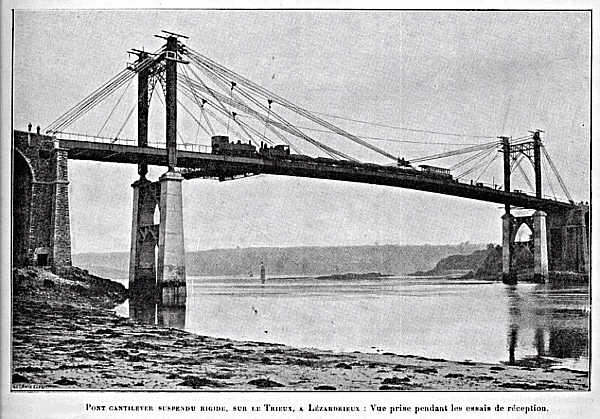
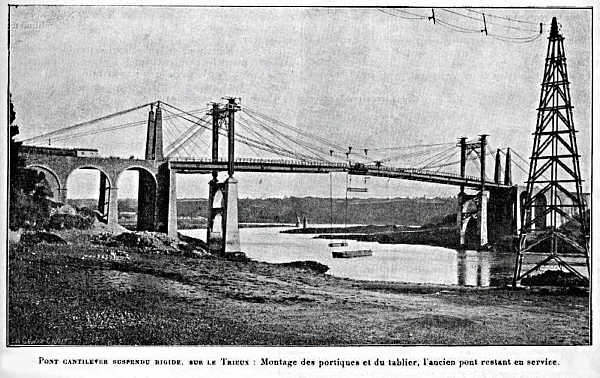
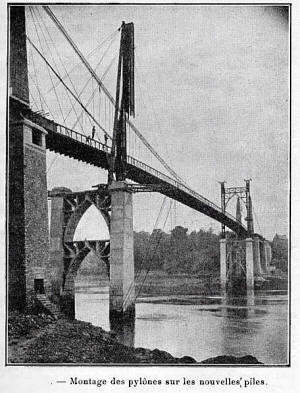
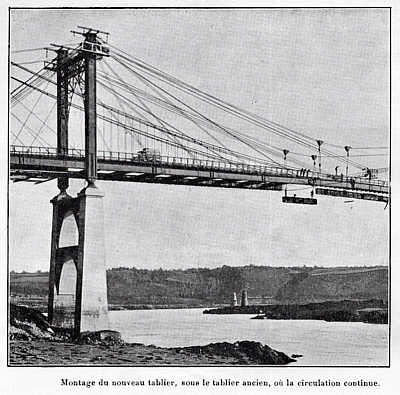
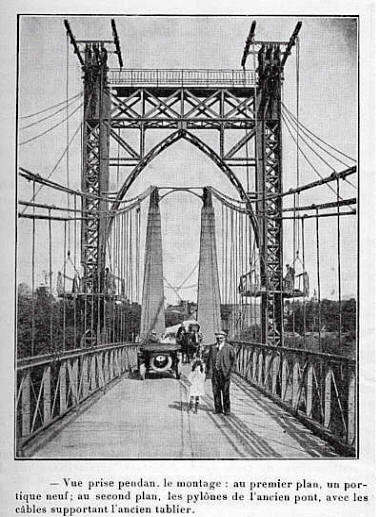
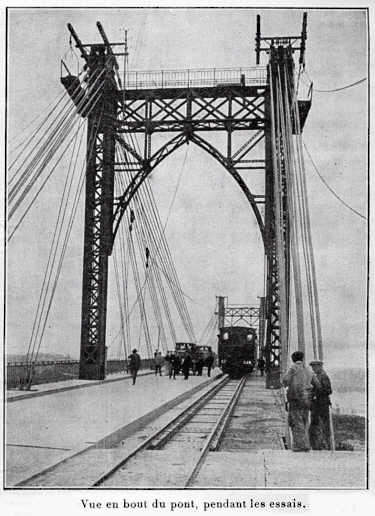
Old poscard
- Ed.cap Levy-Neurdein
(Coll. M.W.)
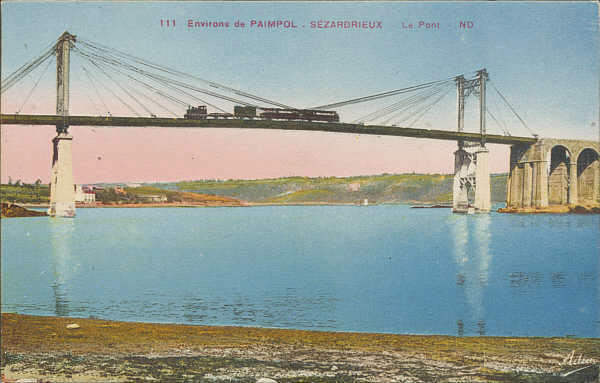
Old poscard
Ed A.Warron St Brieuc(Coll.
M.W.)
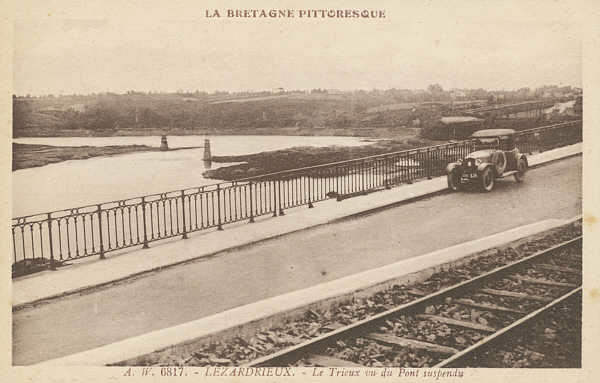
Postcard
reproducing a watercolorof
R .Meheux,
published
by the
Association des chemins de fer des Côtes du Nord(Coll.
M.W.)
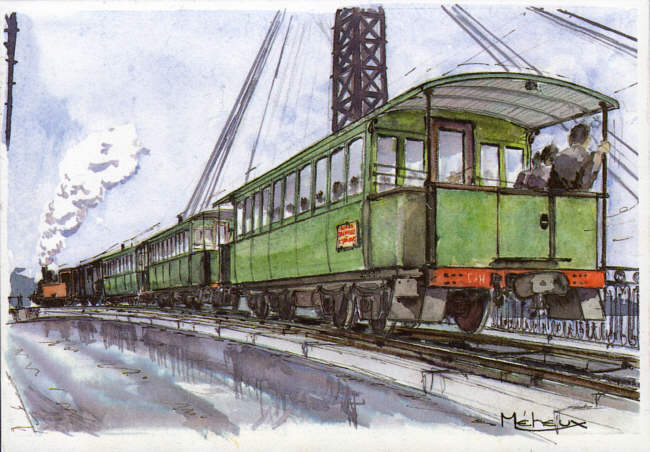
The bridge
will be subsequently converted
into road
bridge restored in 1993;
it is still in service.Old postcard and
modern postcard, current state of the bridge
(Ed Vacances-Paris
9e)
(coll M.W.)
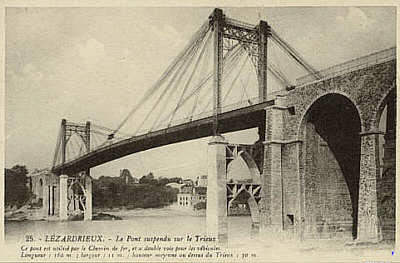
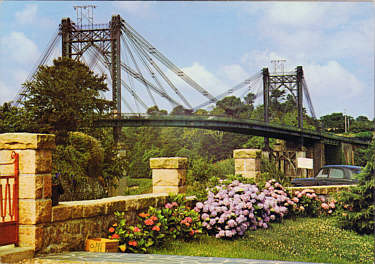
The bridge will be transformed thereafter into road bridge and will be
restored in 1993; it is always in service.
Postal cancel
(Flame)
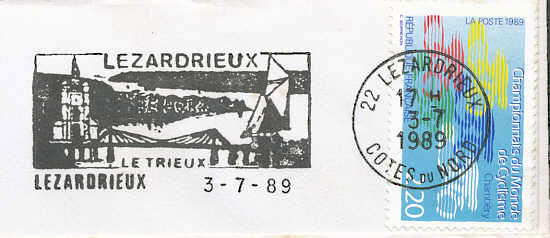
Modern postcard and postal flame: it should be noted that on
the latter is not reproduced the cabling system of a bridge gisclard but
that of a traditional suspension bridge...(coll
M.W.)
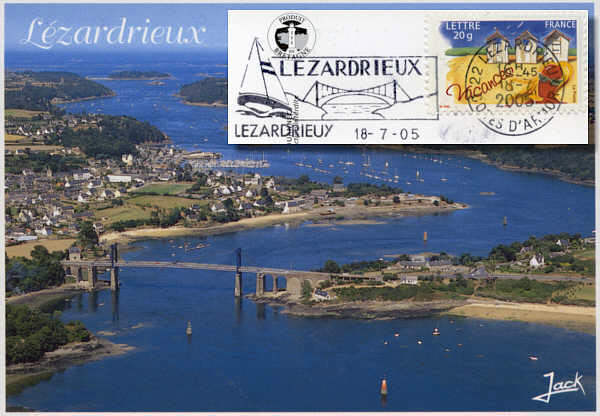
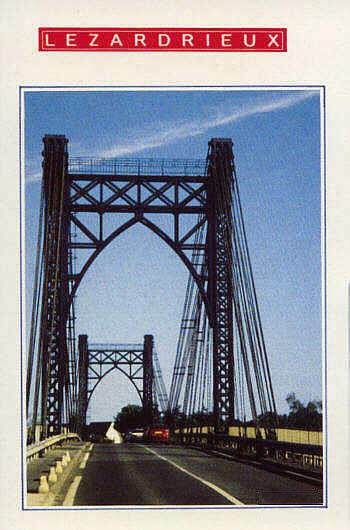
Lezardrieux modern postcard ( Ed Dubray-27-Conches (coll M.W.)
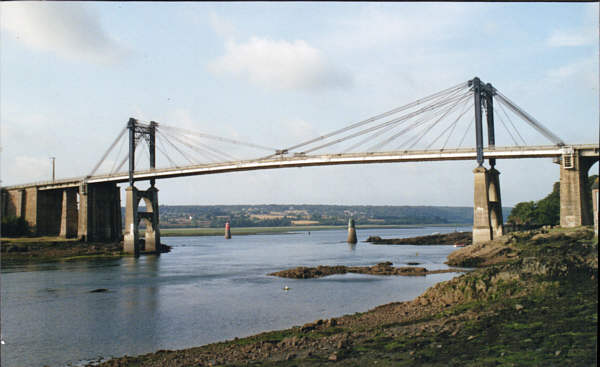
Photography (18.07.05 - M. Wagner)
Postal stationary from
2010
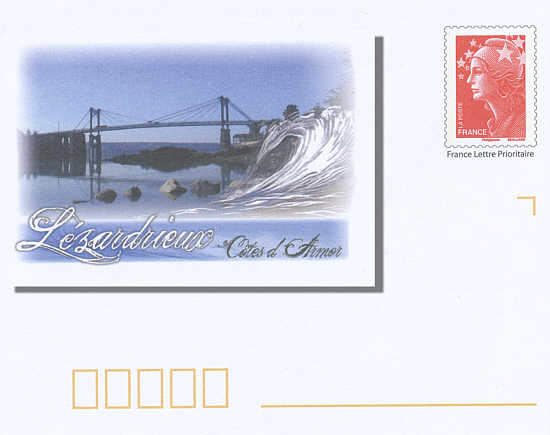
Personalized stamps from 2010
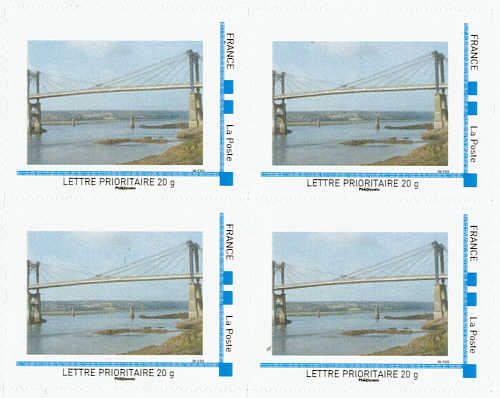
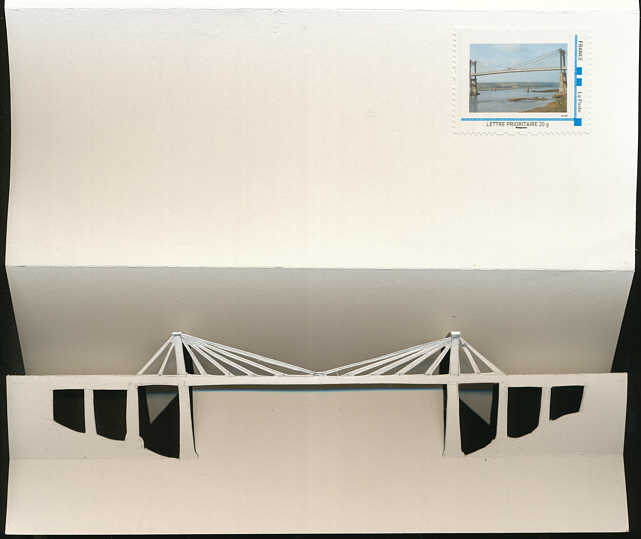
In 1924 will be set up a bridge
at
Saint Leu d' Esserent
in Oise, with a span of 77.70, replaced in 1949 by
a suspension bridge with parabolic suspension.
The
bridge, destroyed during the first world war - Poscard sent in
1915- L.C.H. Paris
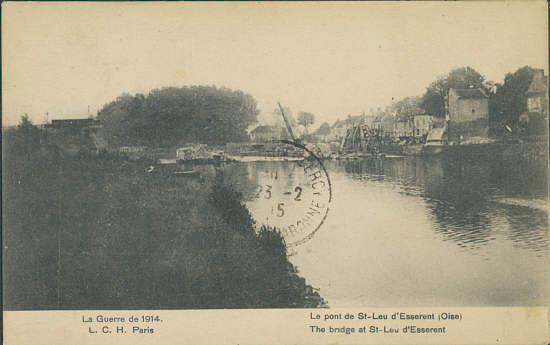
The bridge built in 1924- poscard
sent in 1925Photo
Edition Paris
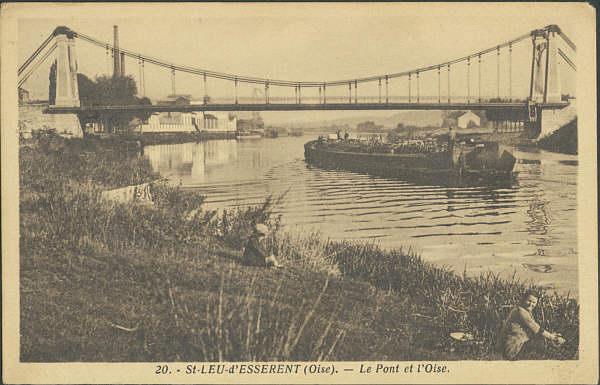
The new parabolic suspension bridge postal cancellations from 1967&1987
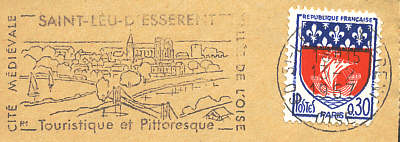
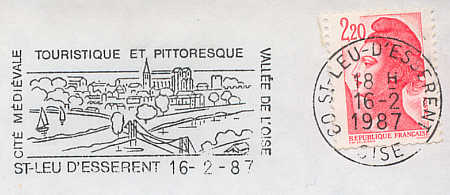
Another bridge
is built on contest at Lumes in
the Ardennes in 1925 (span 75.60m).
Both
were
constructed in a manner
similar to that of the
bridge Lézardrieux
system.
Bridge of Lumes-
Old postcards
( coll. M.W.)
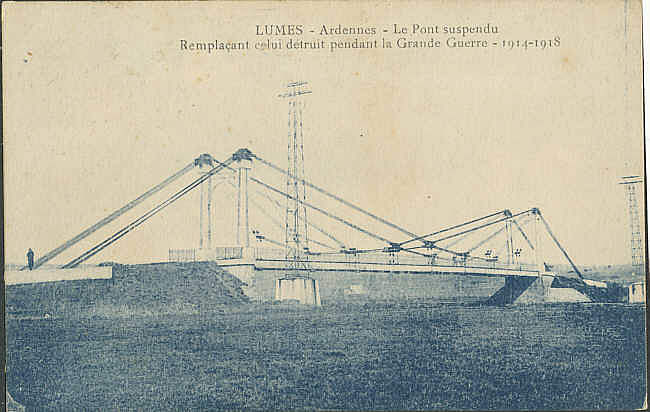
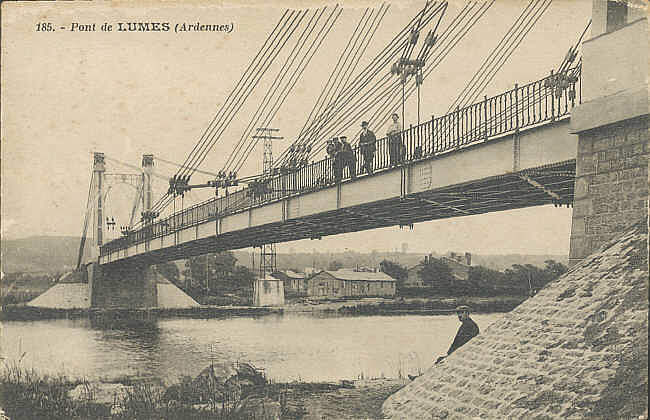
The bridge "El Colgante" of Santa Fé - Argentina
The history of this bridge, the " bridge of the
Engineer Martial Candoti " is confidentially connected to that of the
city of Santa Fé a particular symbol of which it became since 1903. Real
barometer of the whims of the Rio Parana, it collapsed four times and
four times was reconstructed. Placed at the end of the lagoon Setubal,
this road bridge also served as aqueduct in its various versions.
.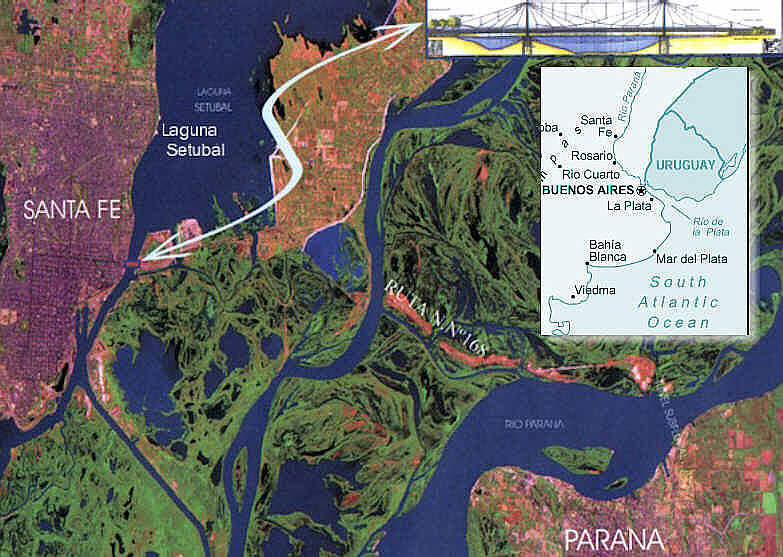
Photograph air and plane, document of the site of the government of
Santa Fé
(Ministerio de Hacienda y Finanzas
-
Unidad Ejecutora Provincial (U.E.P.))
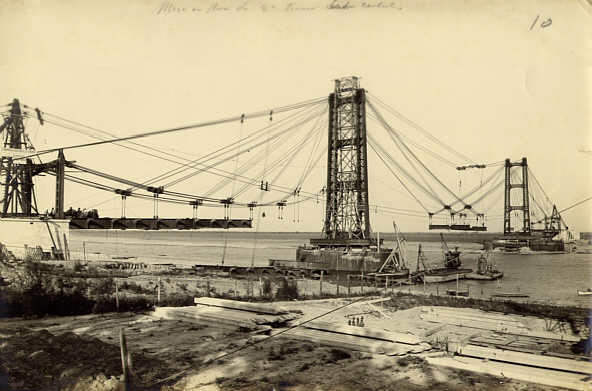
The
bridge in the course of assembly, photograph of the 28/11/1924
(Coll. D.
Leinekugel LeCocq)
In 1922 after the
destruction by a floods of a bridge in the course of construction, engineer Martial R. Candioti, person in charge for the
sanitary works of
the Nation entrusted to the engineer A. Paitovi the study of a possible
establishment of a
Gislard type bridge.
A contest was launched and it was a French company which obtained the
market for all the metallic part, the "Chantiers et Ateliers de la
Gironde", probably subcontractor entreprise of G.LeinekugelLe Cocq.
Indeed ", in 1924 Ferdinand Arnodin dies, his son-in-law, Gaston
Leinekugel-le-Cocq, who married his daughter Aline, leaves settling down
to Larche, next to Brive-la-Gaillarde, in an existing factory. He moves
the wire-stranding machine and takes archives. From this moment all the
bridge Arnodin-Leinekugel goes out of Larche, the factory of Châteauneuf
is sold. " (source: J.M.Hervé )
Modern
postcard
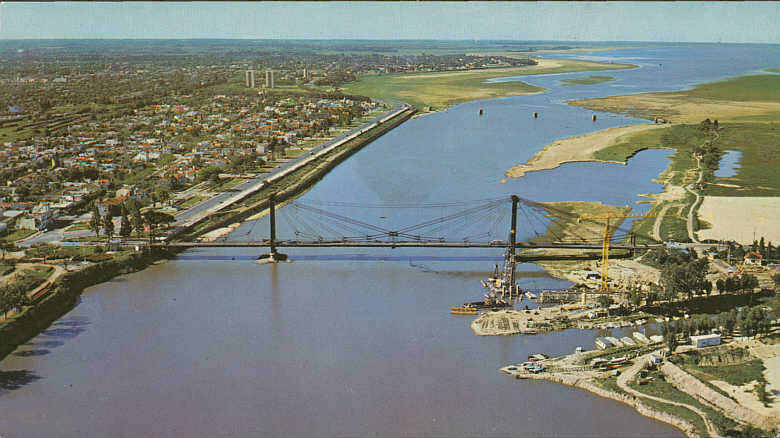
All the armaturewas
made in France
and then
sent directly
by boat to
Santa
Fe to be raised
there.
. The
tests of resistance
took place
on April 28, 1928
and
commissioning on June
8th The bridge consists
of
three spans, 73.85,
147.70
and
73.85
Drawing by
G.Leinekugel Le Cocq
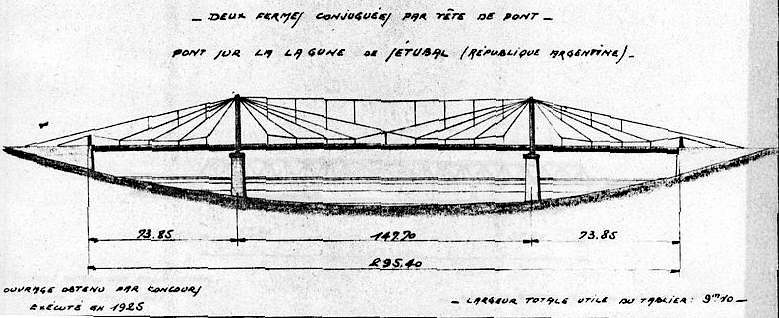
It endured
the second largest
flood of the century
in 1966,
and
in 1971 an
aqueduct was
reincorporated
to the bridge.,
But
it partially
collapsed in
1983.
Old postcard
( coll. M.W.
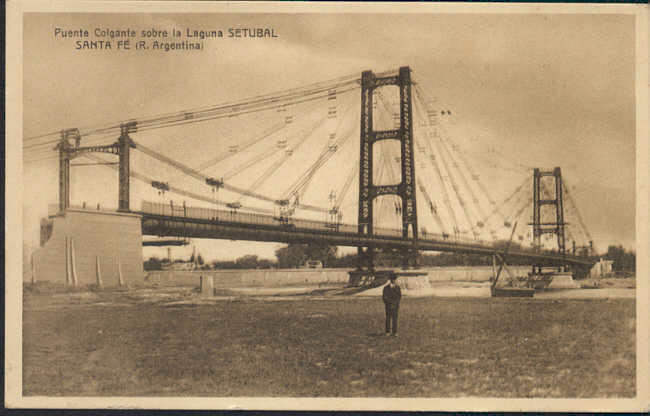
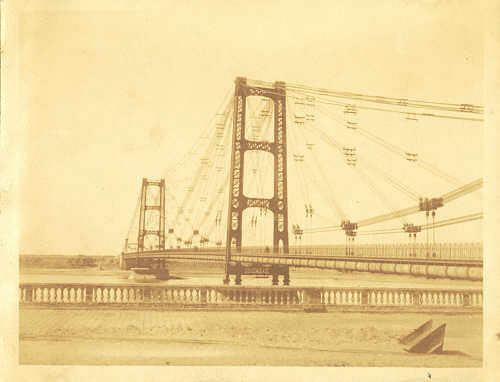
Photography -1938
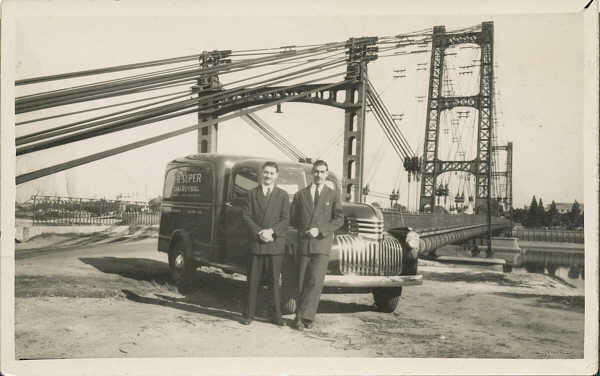
A new international call tender was launched to rebuild
a bridge similar to the precedent with the same system of anchoring and
of wiring This one was completed in 2004.
Two stamps were
issued in Argentina showing the bridge , the
first on October 16th 1982 on the occasion of the Games "
"Cross of the South ",the bridge being used
as visual symbol of the
city, the second on April 17th, 2004 to commemorate its reconstruction.
Yt
n°1323 of 1982 and Yt n° 2445
of 2004
(coll. M.W.)
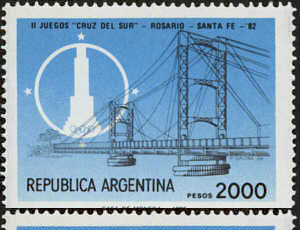
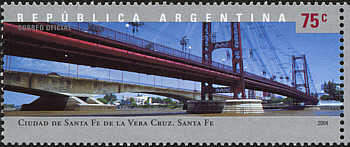
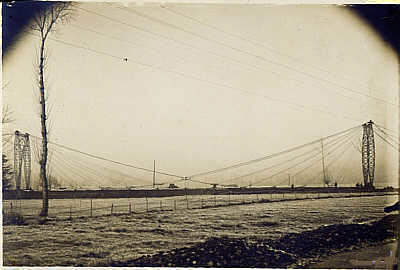 In 1925 a bridge intended for Siam
is
built with a span of 82.50 m, then, a second in 1926 (span of 122.50 m)
In 1925 a bridge intended for Siam
is
built with a span of 82.50 m, then, a second in 1926 (span of 122.50 m)
Tests
of assembly of the bridge intended for Siam
photograph of time
coll D Leinekugel LeCocq
In 1927 a bridge is built on the small Rhone, the
bridge of Chartrouse, property of Mrs. Senty-Lavigne, 1 span of
88.50m
This bridge will be modified then rebuilt by Freyssinet engineering with
an innovation on the cables...
Picture D.Bounias, City of
Arles - Bouches du Rhône
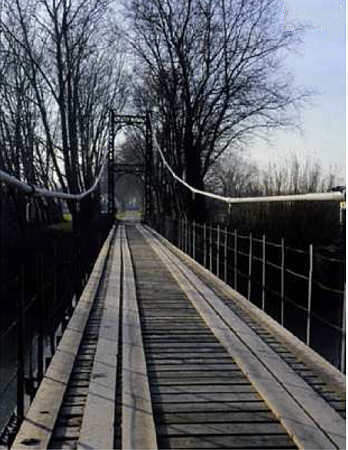
The same year, on contest is built again the bridge of Boran in the Oise
(carried 69.59m) which will have to be rebuilt in a provisional way
en1941-42 using three elements of Pigeaud bridges. It will be
transformed in 1975 into parabolic suspension bridge.
The bridge of Boran
1927 /1940 -Old postcards (coll. M.W.)
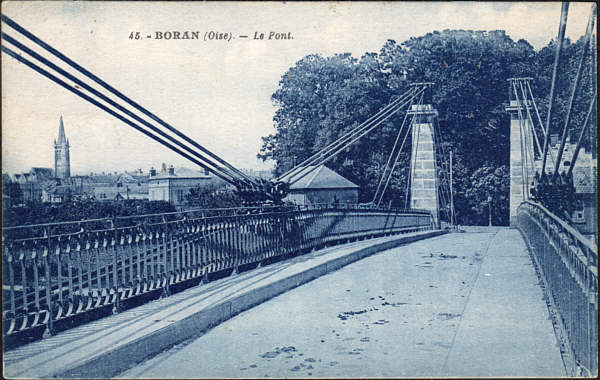
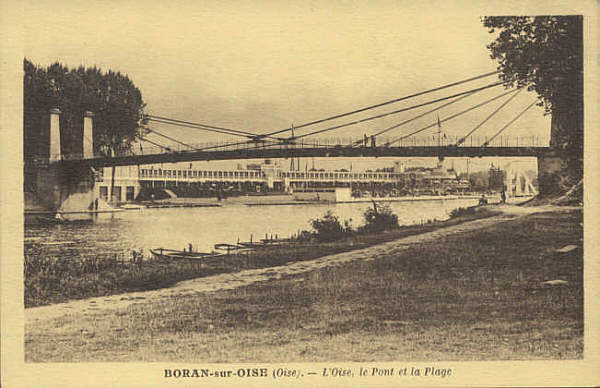
The bridge of Boran in its third state (1940-1975)
-
postcards (coll. M.W.)
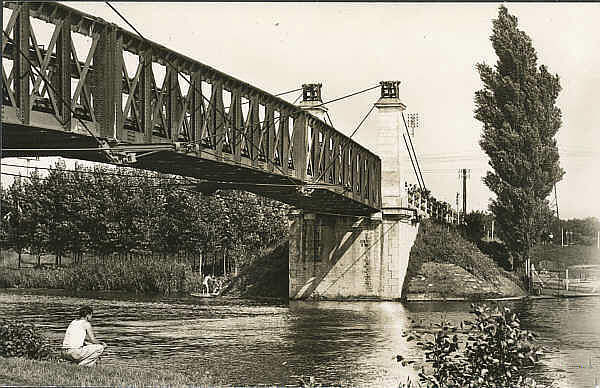
The bridge connecting
Vitry and Alfortville called
the
Bridge of the "Port à l'Anglais"
was undertaken on contest since 1913. Stopped by the war
of 1914-18, its work lasted until 1927. It consists of three spans of
57.05, 129.96 and 58.25m, in more of those directly inspired by the
Gisclard system, of the cables connects between them the two monumental
pylons.
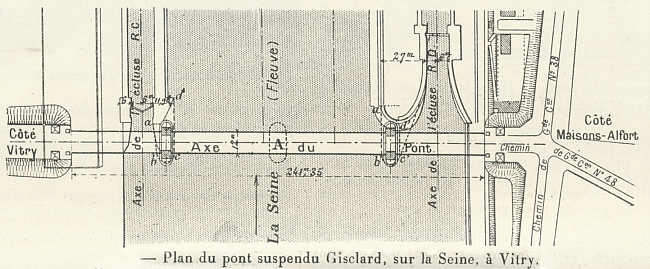
The
first project was replaced by a second,
the steel towers
that have been deemed
unsightly porches
were replaced by
masonry
more
"traditional"
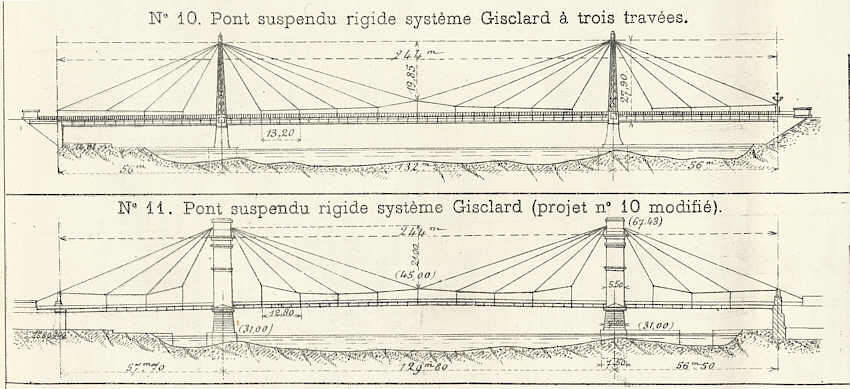
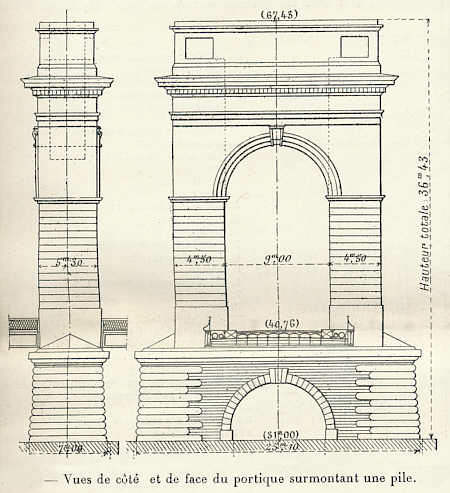
This project type
Gisclard offered
the major advantage
of being one of the least
expensive and
also allowed
the one hand a reduction
of metal weight
while maintaining rigidity of
the assembly.
Its construction system
using the use of a
"download"
("Blondin"),
also allowed not to interrupt
the navigation
on the Seine.
The bridge
of 244m consists
of three spans,
of 57.05,
129.96 and
58.25m.
Interrupted by the war of
1914-18,
his work lasted until
1927.
Many time altered, then repaired the bridge is always in service.
Construction of the bridge - Photos from a booklet - "Arnodin fund"
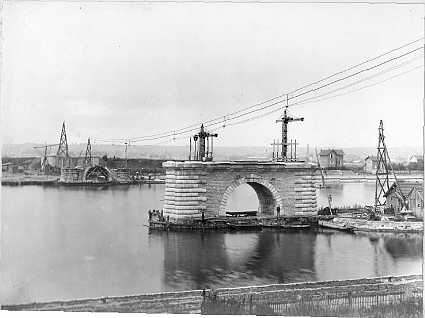
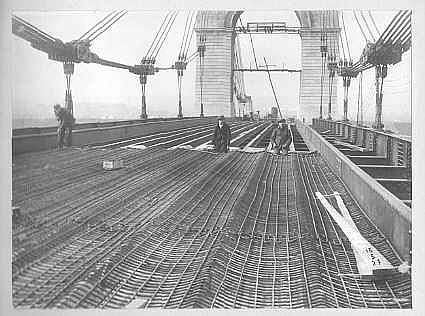
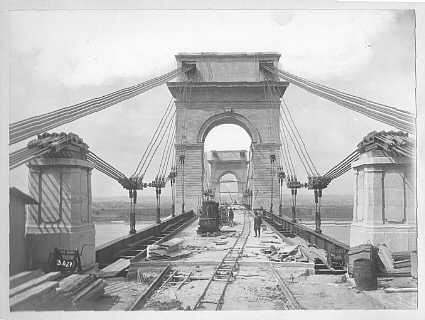
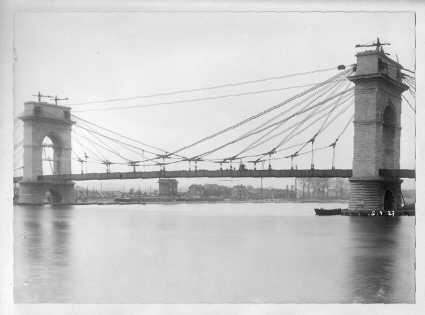
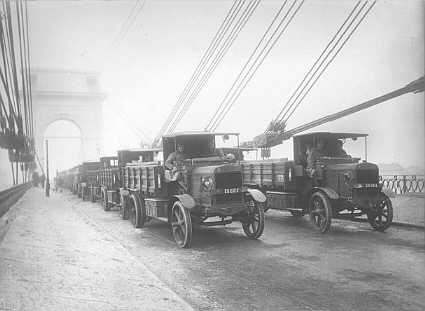
Bridge
of Vitry/Alfortville, old postcard
(Coll. M.W.)
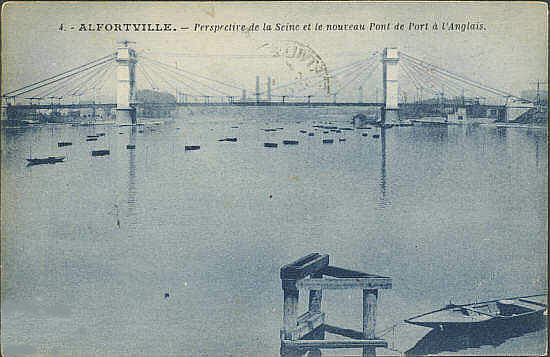
Stamp
day letter from 1942
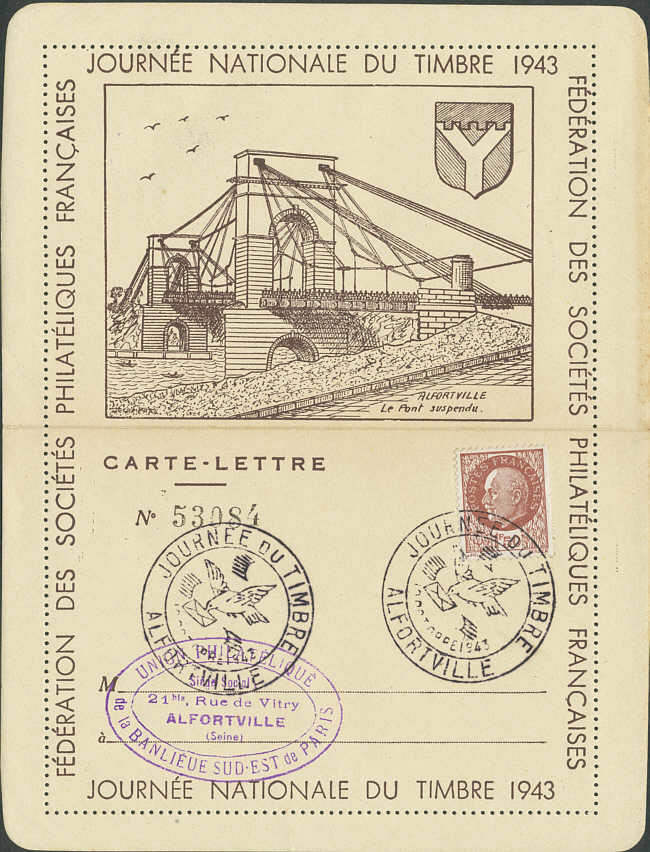
Bridge of Vitry ; postal stationery
c-1995 (coll.
M.W.)

Postal stationery
c-1998 (coll.
M.W.)

Old postcards
(coll. M.W.)
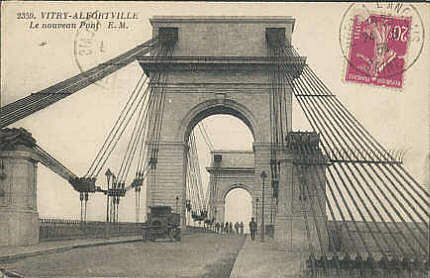
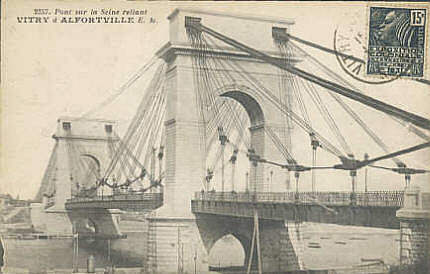
Alfortville: cancellations secap of
1991and 1999, showing the
diagram of the bridge(coll.
M.W.)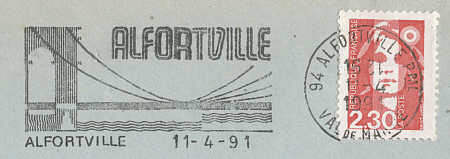
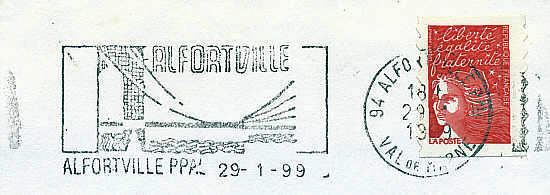
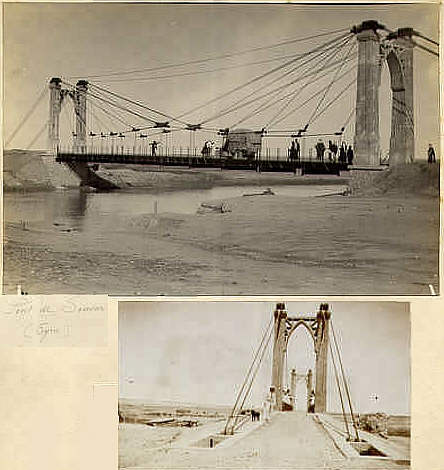
Two bridges finally were built in Syria,
the first in 1928, in Souvar on Khabour
(
span 52,50 m) , tnen at Deir-Ez-Zor in 1929.
The
bridge of Souvar in Syria, photographies ,
(coll D.
Leinekugel Cocq)
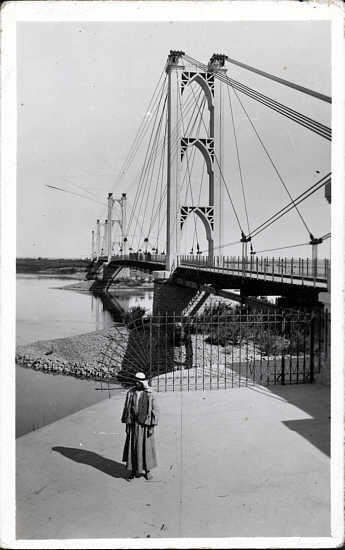
the bridge of Deir - Ez - Zor,
This narrow footbridge was built by French on
competition between 1927 and 1929 above the Euphrates, it, essentially
for military reasons, the city accommodating then an advanced post of
the "foreign legion. For the disturbed period, when, after the fall of
the Ottoman Empire, the will of independence of the nationalists, the
installation of the French mandate over the "Great Lebanon", and the
takeover of Vichy in 1940. Syria emitted in this period a set of seven
stamps dedicated to this bridge.This one became then a stake in the
battles which acted in this period during the second world war: French
would have tried to blow up it, but unsuccessfully during the fights
which set Supporters of the Vichy government and Free French Forces
allied to the British. n spite of the victory of these last ones and the
declaration of independence of Syria, this one will be effective only in
1946 with the definitive departure of the French troops. The intact
bridge could be considered from then by the Syrian as a symbol of their
access to the independence....
Old poscard (coll.
M.W.)
and photography 'P.Cowsert 2009
.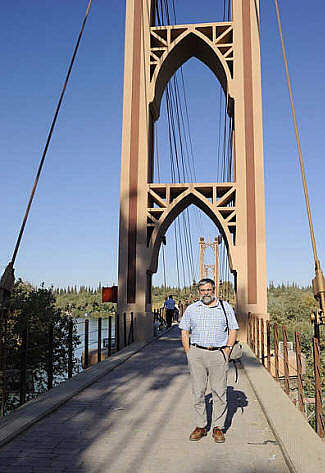
It is the last and longest(?) bridge of the Gisclard type built under
this licence.
Constituted of five spans, three of 112.50 m and two of 34.62 at the
ends, It is always upright, but is used more only for one pedestrian
use.
Set
of stamps from Syria YTn°A87 /A93 of 1940 + color proof (coll.
M.W.)
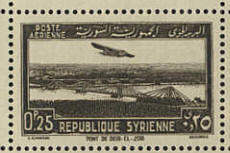
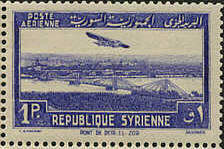
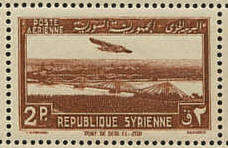
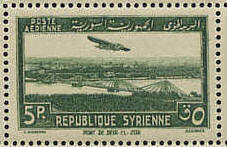
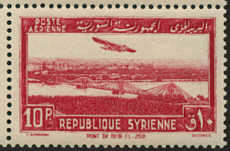
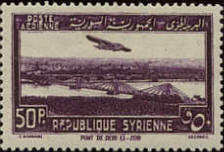
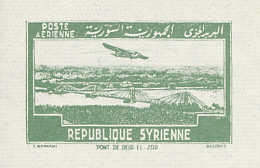

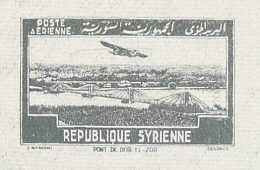
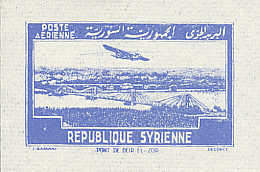
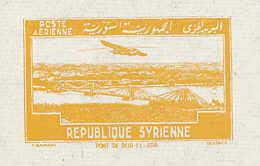
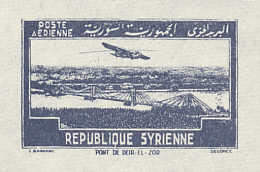
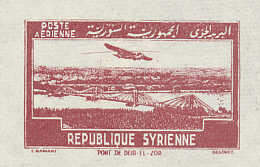
1944: cover, from Damas to Alger
(coll. M.W.)
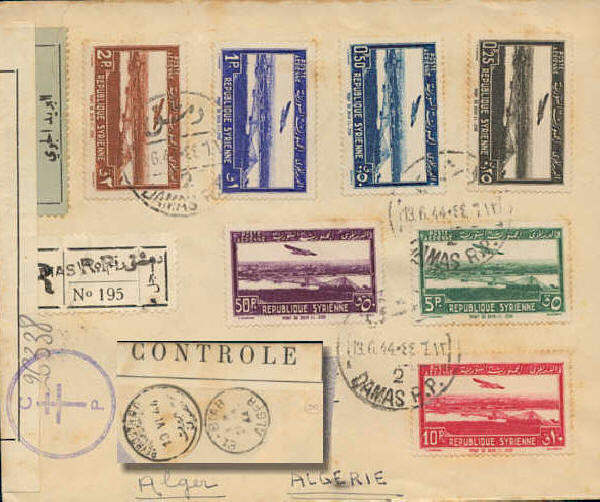
Other projects began,et were
not finished, often following conflicts; much was not born... So
the bridge of Port StJean - Port St Hubert over the Rance river, under
construction before the war of 1914, who was reconstructed in suspension
bridge .
Old
postcard, The bridge under construction
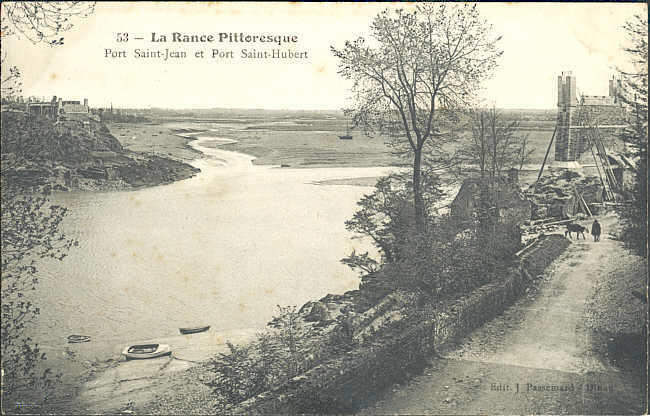
Little was
celebrated with their right value, and their designers too often wrongfully forgotten . I want to pay homage here to them.
I dedicate this article to Didier LEINEKUGEL LE
COCQ, grandson of Gaston Leinekugel Le Cocq, great grandson of Ferdinand
Arnodin, died on October 30th, 2009, at the age of 67, without the help
of which I would never have been able to draft this article.
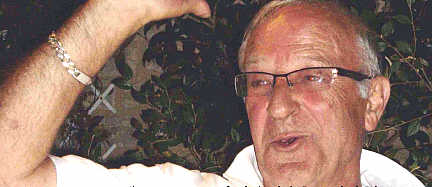
-"De Fer et de Rève" catalogues, exhibition of the Museum of the Navy of the Loire, Châteauneuf on the Loire.
- Marcel PRADE: "Ponts et Viaducs au XIXe siècle"- Brissaud Poitiers / Errance
- Serge Montens: "most beautiful bridges of France" ED Bonneton - 2001
- Files and documents pleasantly provided by Didier Leinekugel Le Cocq,
- Files and documents pleasantly provided by Didier Chénot ("Arnodin Fund"
- "Le Génie Civil"- Revue 1900>>1932...
...